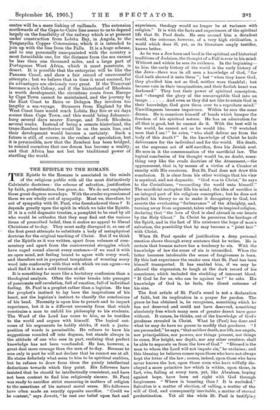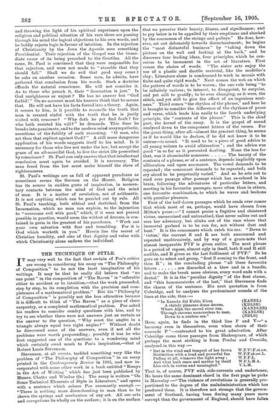Calvinistic doctrines : the scheme of salvation, justification by faith,
predestination, free grace, &c. We do not emphasise these great dogmas nowadays. With the cruder expressions of them we are wholly.out of sympathy. Must we, therefore, be out of sympathy with St. Paul, who foreshadowed them ? It depends greatly upon the spirit in which we take the Epistle. If it is a cold dogmatic treatise, a pamphlet to be read by all who would be orthodox that they may find out the various items of prescribed belief, then it makes no appeal to liberal Christians of to-day. They must sadly disregard it, as one of the first great attempts to substitute a body of metaphysical doctrine for the original teaching of Christ. But if we think of the Epistle as it was written, apart from volumes of com- mentary and apart from the controversial struggles which have raged round almost every sentence—if we read it with an open mind, not feeling bound to agree with every word, and therefore not in perpetual temptation of wresting every word into conformity with that with which we can agree—we shall find it is not a cold treatise at all.
It. is something far more like a hortatory confession than a theological analysis. Often the writer breaks into passages of passionate self-revelation, full of emotion, full of individual feeling. St. Paul is a prophet rather than a logician. He has the prophet's instinct to lay bare the inspirations of his heart, not the logician's instinct to classify the conclusions of his head. Necessity is upon him to preach and to impart experience, but it is a different necessity from that which constrains a man to unfold his philosophy to his students. The Word of the. Lord has come to. him, so he testifies to the world and argues with himself. The logical out- come of his arguments he boldly shirks, if such a juxta- position of words is permissible. He refuses to have his suggestions rounded off into dogmas, but stands always in the attitude of one who sees in part, realising that perfect knowledge has not been vouchsafed. He has, however, a great deal more courage than the men of to-day. Because he sees only in part he will not declare that be cannot see at all. He states definitely what seem to him to be spiritual realities, but he refuses to draw• from them the. purely intellectual deductions 'towards which they point. His followers have insisted that he. should be intellectually consistent, and have not been content to find him religiously sincere. St. Paul was ready to sacrifice strict reasoning in matters of religion to the assertions of his natural moral sense. His followers have often made an 'exactly opposite sacrifice. " Could we be content," says Jowett, "to rest our belief upon fact and
experience, theology would no longer be at variance with religion." It is with the facts and experiences of the spiritual life that St. Paul deals. He sees around him a decadent world, the outcome, however, of a very high civilisation, .a world which does ill, yet, as its literature amply testifies, knows better.
As he was a Jew born and bred in the spiritual and historical traditions of Judaism, the thought of a Fall is ever in his mind- Without and within he sees its evidence. In the beginning— to him the early history of the world is the early history of the Jews—there was in all men a knowledge of God, ." for God bath spewed it unto them "; but " when they knew God, they glorified him not as God, neither were .thankful ; but became vain in their imaginations, and their foolish heart was darkened." They lost their power of spiritual conception, and " changed the glory of the uncorruptible God into an
image And even as they did not like to retain God in their knowledge, God gave them over to a reprobate mind:" Unwillingness became impotence. Within he sees the same drama. He is conscious himself of bonds which hamper the freedom of his spiritual nature. He has an admiration for all that is good, but he cannot do it. With the best will in the world, be cannot act as he would like. ".O wretched man that I am !" he cries, " who shall deliver me from the body of this death ? " In the knowledge of Christ he hails deliverance for the individual and for the world. His death, as the supreme act of self-sacrifice, fires his Jewish soul. He sees in it the consummation of the sacrificial law. The logical conclusion of his thought would be, no doubt, some- thing very like the crude doctrine of the Atonement, —the appeasement, that is, by means of a victim of a Creator at enmity with His creatures. But St. Paul does not draw this conclusion. It is clear from his other writings that his view is mystical, and not dogmatic. "God was in Christ," he says to the Corinthians, " reconciling the world unto himself." The sacrificial metaphor fills his mind; the idea of sacrifice is an integral part of his religious conception; but he does not perfect his theory so as to make it derogatory to God, but asserts the everlasting " forbearance " of the Almighty, and, turning away from argument, takes refuge in inspired religion, declaiing that " the love of God is shed abroad in our hearts by the Holy Ghost." In Christ he perceives the heritage of the Spirit, and in the fact of His. existence the hope of man's salvation, the possibility that he may become a " joint heir " with Christ.
When St. Paul speaks of justification a deep personal emotion shows through every sentence that he writes. He is certain that human nature has a tendency to sin. With the knowledge of law the sense of sin is intensified. When the latter becomes intolerable the sense of forgiveness is born. By this last experience the reader sees that St. Paul has been himself transported. It has enabled him, if we may be allowed the expression, to laugh at the dark record of his conscience, which included the shedding of innocent blood. " If God be for us, who can be against us ? " he asks. His knowledge of God is, he feels, the direct outcome of his sins. .
The first article of St. Paul's creed is not a declaration of faith, but its implication in a prayer for pardon. The grace he has obtained is, he recognises, something which he has not deserved and could not have deserved, something absolutely free which many men of greater desert have gone without. It comes, he thinks, out of the knowledge of God's goodness revealed in Christ. What he (Paul) has done and what he may.do have no power to modify that goodness. , I am persuaded," he says, "that neither death, nor life, nor angels, nor principalities, nor powers, nor things present, nor things to come, Nor height, nor depth, nor any other creature, shall be able to separate us from the love of God." "Blessed is the man to whom the Lord will not impute sin," he exclaims ; and this blessing be believes comes upon those who have not always kept the letter of the law ; comes, indeed, upon those who have' never known the law, upon those even who haie wilfully dis- obeyed a more primitive law which is within, upon those, in fact, who, failing at every turn, yet, like Abraham, hoping against hope, have been set right with God through forgiveness. "' Where is boasting then ? It is excluded." Salvation is a matter of election, of calling, a matter of the will of God, and consequently inevitable, a matter 'of eternal predestination. Yet all the while St. Paul is testifying
and throwing the light of his spiritual experience upon the religious and political situation of his race there are passing through his mind the logical objections to his own words, and he boldly rejects logic in favour of intuition. In the rejection of Christianity by the Jews the Apostle sees something Providential. Their rejection of the Gospel was the imme- diate cause of its being preached to the Gentiles. All the same, St. Paul is convinced that they were responsible for that rejection, and were not made to " stumble that they should fall." Shall we do evil that good may come p he asks on another occasion. Some men, he admits, have gathered that conclusion from his words. Such a doctrine offends the natural conscience. He will not consider it. As to those who preach it, their " damnation is just." Is God unrighteous or unjust ? He has no answer but " God forbid ! " On no account must his hearers think that he means that. He will not have his facts forced into a theory. Again, it occurs to him, is it possible to reconcile the truth that man is created sinful with the truth that he is justly visited with remorse ? " Why doth he yet find fault P for who bath resisted his will?" he demands. This time he breaks into passionate, and to the modern mind unsympathetic, assertions of the futility of such reasoning. " 0 man, who art thou that repliest against God ? " A still more dangerous application of his words suggests itself to his mind. Is it necessary for those who live not under the law, but accept the grace of an all-merciful God, to live the strict life prescribed by conscience ? St. Paul can only answer that that intellectual conclusion must again be avoided. It is necessary. The man freed from the law must make himself the slave of righteousness.
St. Paul's writings are as full of apparent paradoxes as sometimes seems the Sermon on the Mount. Religion has its source in sudden gusts of inspiration, in momen- tary contacts between the mind of God and the mind of man. It is a matter of revelation, not of arithmetic. It is not anything which can be puzzled out by rule. All St. Paul's teaching, both ethical and doctrinal, from the Incarnation, which no man can explain, to the injunction to " overcome evil with good," which, if it were not proved possible in practice, would seem the wildest of dreams, is con- tained in germ in the greatest of his paradoxes. " Work out your own salvation with fear and trembling. For it is God which worketh in you." Herein lies the secret of Christian humility, and also of that dignity and value with which Christianity alone endows the individual.











































 Previous page
Previous page